thebigpicture
Latest
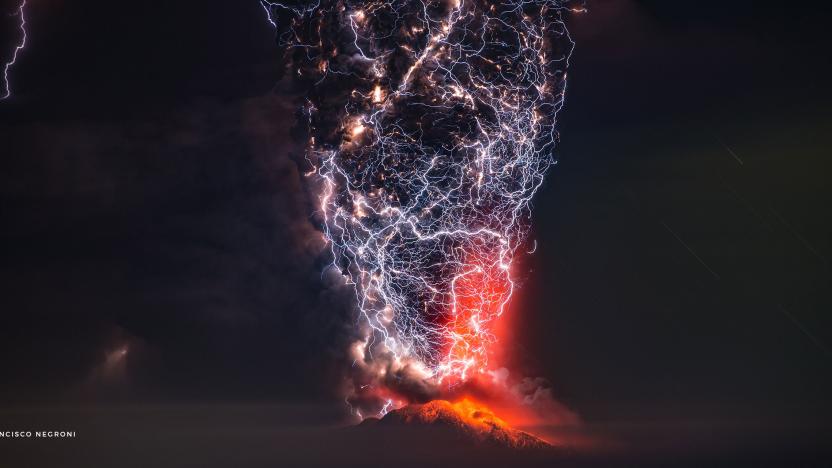
Catching lightning in a volcanic bottle
What do you get when you marry two of Earth's most dramatic natural events, lightning and volcanoes? The answer is a "dirty storm," an infernal melange of lightning, magmatic fire and ash that surpasses even the wildest Hollywood disaster movie effects. If the volcano has enough energy, dozens of bolts -- which blast upwards, rather than downwards -- can spawn in the ash. At the Volcán Calbuco in Chile, photographer Francisco Negroni captured a stunning example of the phenomenon, winning second prize at this year's Epson Pano awards.
Steve Dent11.27.2017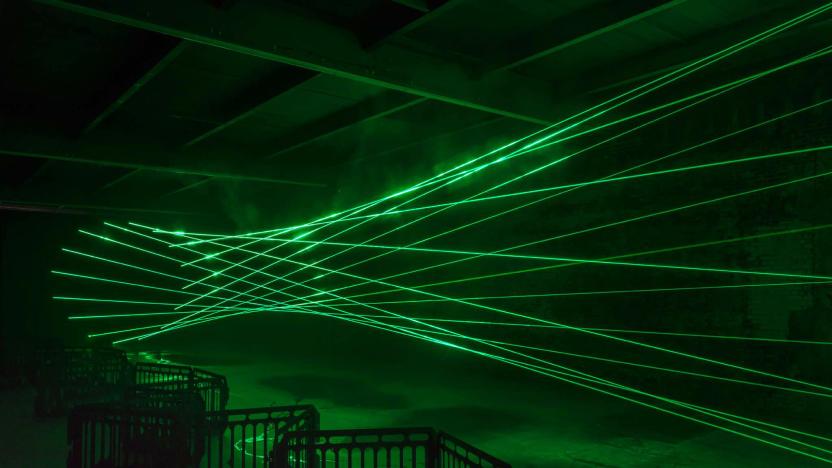
Laser wormhole art is as dazzling as it is dangerous
When an artwork features both high-intensity lasers and a carbon fiber sculpture to keep spectators back, you know it's not going to be dull. Rita McBride's Particulates art installation at the Dia Art Foundation in Chelsea, New York features 16 lasers, scattered by particles of dust and water, forming a visual depiction of a science fiction "wormhole." The barrier, meanwhile, is meant to keep you away from said lasers, which are strong enough to do some harm.
Steve Dent11.21.2017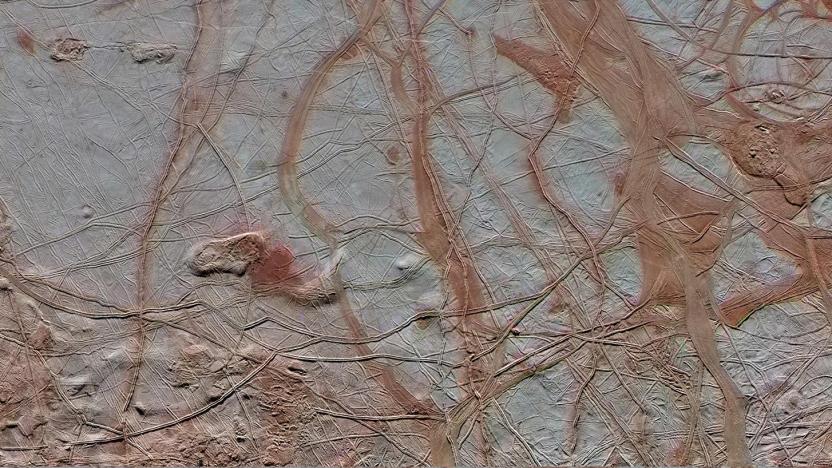
Touring the solar system with a new book of NASA photos
It's easy to get jaded by images of our solar system, especially when NASA probes like Cassini make it look so routine. A new book called The Planets, written and curated by Nirmala Nataraj with a forward by Bill Nye and featuring hundreds of stunning NASA images, should cure you of your cynicism. As Nye puts it, we haven't exactly been doing this for a long time. "You are looking at images with a clarity and sharpness that our ancestors probably couldn't even imagine, let alone capture," he said.
Steve Dent11.13.2017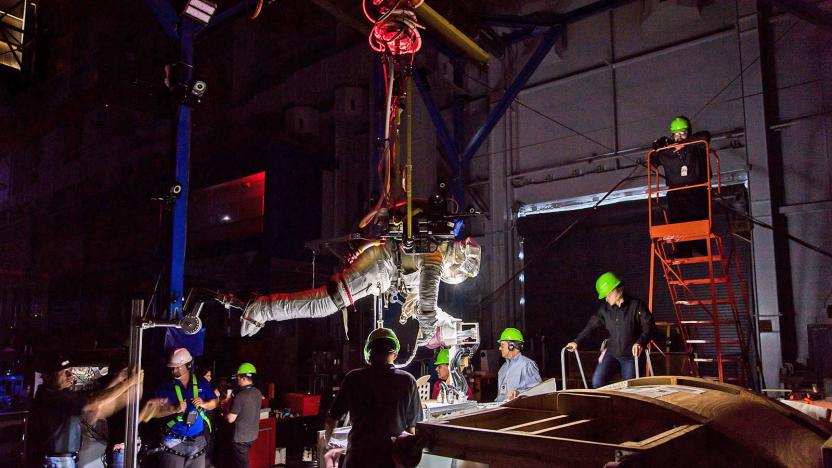
Learning to fly with NASA's spacewalk simulator
What you're looking at is not a production set photo from Gravity, but rather a training simulation for Canadian Space Agency astronaut Jeremy Hansen. He's suspended over a mockup of the International Space Station (ISS), while attached to the Active Response Gravity Offload System (ARGOS) at NASA's Johnson Space Center in Houston, Texas. For this particular session, engineers ran tests in both light and darkness to simulate the 90 minute day/night cycles experienced by orbiting astronauts.
Steve Dent11.06.2017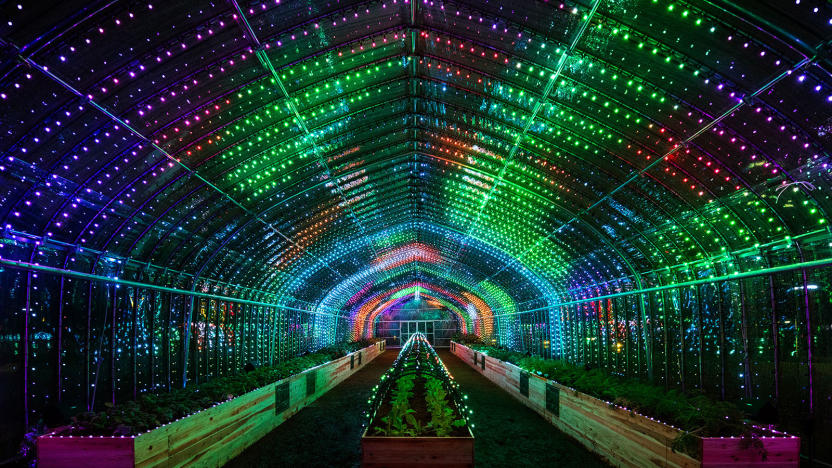
'Digital vegetables' emit music and light when touched
Small-plot urban farming used to be widespread in Tokyo, but other than specialized projects like the Pasona Urban Farm, there aren't many tomato plots around the city anymore. A Tokyo creative lab called Party has created an art installation that aiming to puts residents literally back in touch with their gardening roots with a digitally-enhanced greenhouse installation called "Digital Vegetables," or "DigiVege" in Japan.
Steve Dent10.30.2017
Bringing a shipwreck back to life with photogrammetry
A little over 76 years ago, the British merchant steam ship SS Thistlegorm was sunk by a WW II German bomber off the coast of Egypt, taking nine souls down with it. It has only been seen in detail by divers, but a new website from the University of Nottingham and Egypt's Alexandria Universities lets you experience the shipwreck via immersive 3D models and 360-degree VR videos.
Steve Dent10.23.2017
A 747 'Supertanker' rains retardant on California's wildfires
A converted Boeing 747-400 used to fight fires is a great example of old technology reborn with a new purpose. The aircraft, the largest passenger model in Boeing's jumbo lineup, first entered service with Japan Airlines in 1991. After being converted to a water tanker, it can now dump up to 19,200 gallons of water or retardant in just six seconds as low as 200 feet above ground level (AGL), then climb away at 6,000 feet per minute. Those stellar capabilities have made it a big help in fighting California's insanely aggressive wine country fires, which have so far killed 40 people and destroyed over 200 homes.
Steve Dent10.16.2017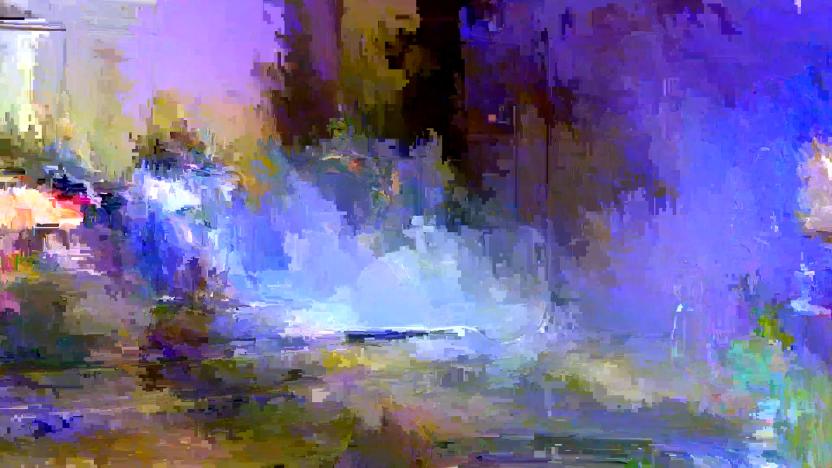
Twitter bot's 'Glitch Art' is a digital impressionist dream
While most people find video glitches or artifacts distracting, some folks see the beauty in them. One of those is programmer and visual artist David Kraftsow, known for his trippy YooouuuTuuube generator and delightfully droll First Person Tetris. One of his latest projects is a Twitter bot called @youtubeartifact that generates so-called Glitch Art out of the occasionally delightful hiccups produced by YouTube's MP4 motion compensation algorithm.
Steve Dent10.09.2017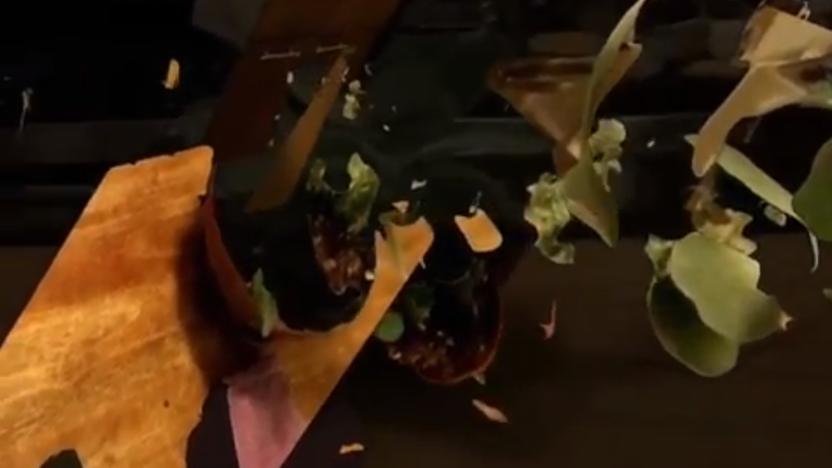
ARKit artist transforms the world into a Cubist nightmare
Every new form of technology gets re-purposed for art and nobody is doing that better with augmented reality right now than educator and "code poetry" researcher Zach Lieberman. In a recent experiment called "exploded camera," he used Apple's augmented reality framework ARKit to map objects and textures in a room. "I kept thinking about ways of pushing it in different directions," he told Engadget. "The idea was that the image would look fine from one vantage point, but as you rotate the camera, you'd see the pieces floating in space."
Steve Dent09.11.2017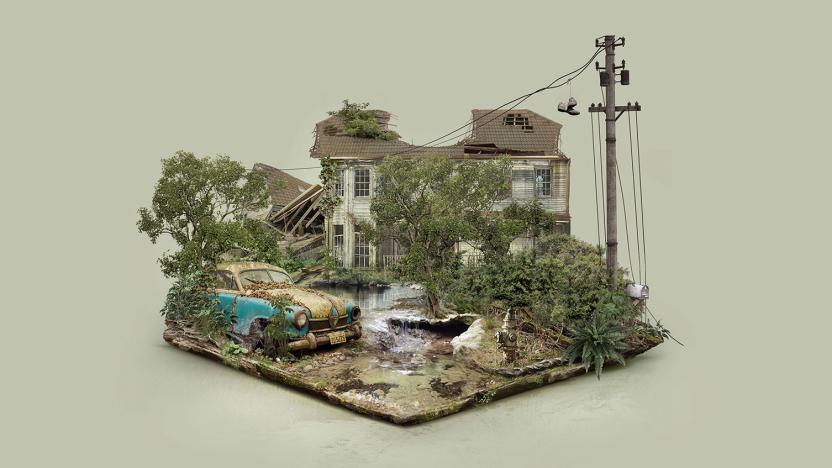
Haunting 'Abandoned Places' float in digital space
"Art is never finished, only abandoned," Leonardo Da Vinci supposedly said, which is maybe why abandonment itself is a popular theme among artists. Abu Dhabi-based Brazilian artist and designer Fábio Araujo has highlighted that loneliness by putting his compact, incredibly detailed "Abandoned Places" creations adrift in a flat, digital sea. Though they resemble movie miniatures, Araujo created the pieces by digital manipulation using an Apple MacBook, Photoshop and Wacom Cintiq tablet.
Steve Dent08.31.2017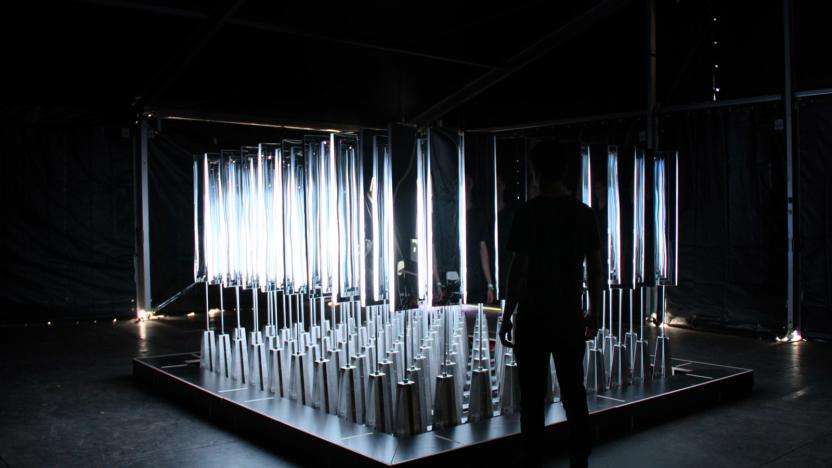
Softlab transforms 'empty' space with light and mirrors
Recently, Engadget visited The Lab, HP's trippy art exhibition incongruously placed in the middle of the Panorama Music Festival in NYC. It proved surprisingly popular among festival-goers thanks to the visual and auditory sensory experiences (and possibly because illegal substances were involved). One in particular stood out from a technological and artistic point of view, however: "Volume," an installation by NYC's SOFTLab.
Steve Dent08.14.2017
Getting NASA astronauts safely out of Orion
As Project Mercury astronaut Gus Grissom learned, NASA spaceflights are not over after splashdown. During his 1961 mission, he barely escaped when the hatch blew too soon and took the "Liberty Bell" capsule to the bottom of the sea. Ever since, NASA has taken splashdown exit procedures very seriously, and it's no exception for the manned Orion capsule that's intended to go to Mars on the tip of the massive Space Launch System (SLS) rocket.
Steve Dent07.31.2017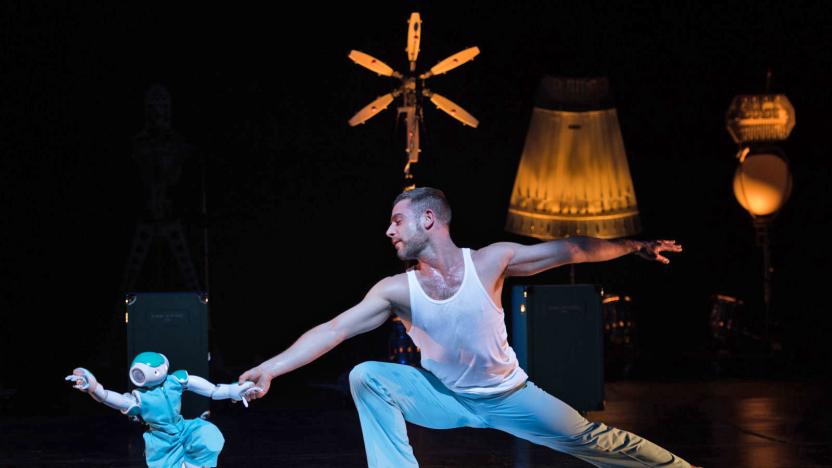
Blanca Li dances with robots to better understand them
Elon Musk, Bill Gates and Stephen Hawking are deeply concerned about AI, but the tech and its ramifications are poorly understood by the public. That disconnect prompted Blanca Li and her dance company to create a choreography for eight dancers called Robot. Produced with Softbank's robotics division and Japanese artists Maywa Denki, it attempts to explore "the interactions between [humans and robots], in an absurd and poetic way."
Steve Dent07.17.2017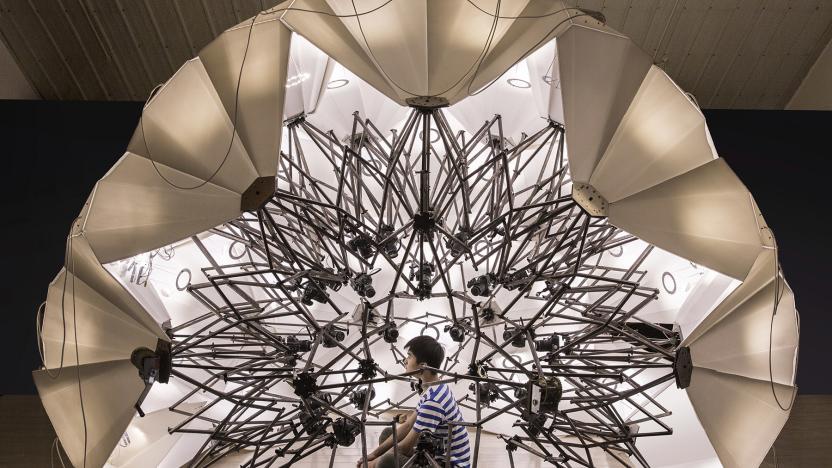
Digitize yourself with the 3D Copypod
Copying yourself digitally is not easy. Ideally, you want multiple photos taken from every angle at the same moment with all-around, soft illumination. A company called People's Industrial Design Office in Beijing, China has created something called the 3D Copypod that can do all that for you in one neat package. It's based on the "Hoberman sphere," a type of geodesic dome that can fold down to a much smaller size thanks to its scissor-like joints.
Steve Dent07.05.2017
Using a 3D render as a French ID card 'photo'
Everybody wants a decent photo ID, but French artist Raphaël Fabre took the quest to a new level. Rather than just having someone snap him, he built a 3D model of his head and torso, then created a nearly photorealistic rendering of himself for a new project called CNI. He submitted that to the French authorities, who duly issued him a carte nationale identité, never realizing that the image was, as he put it, "practically virtual, a video game version, a fiction."
Steve Dent06.20.2017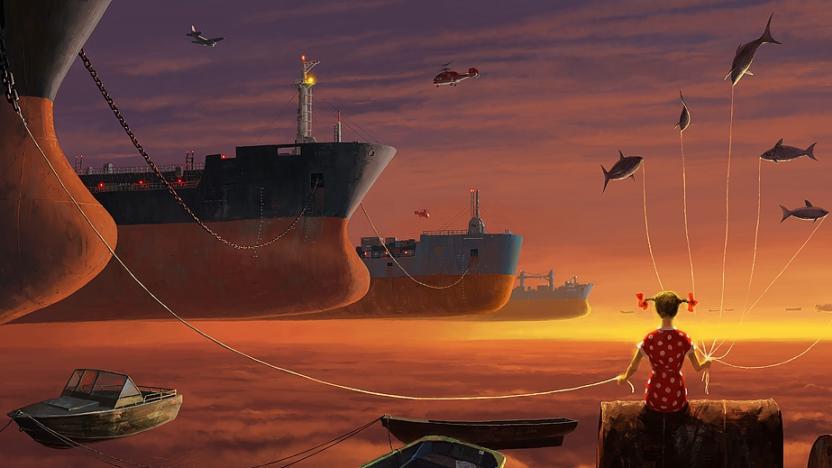
Living a digital dream with Alex Andreev's VR landscapes
"A lucid dream is a dream during which the dreamer is aware of dreaming," says Wikipedia. Artist Alex Andreev offers that experience with his VR dreamscape paintings by messing with the part of your brain that distinguishes reality from fantasy. "Never did I take creation as a product of man's intellect," he says. "Our conscious awareness is only a thin film in the ocean of unconsciousness."
Steve Dent06.03.2017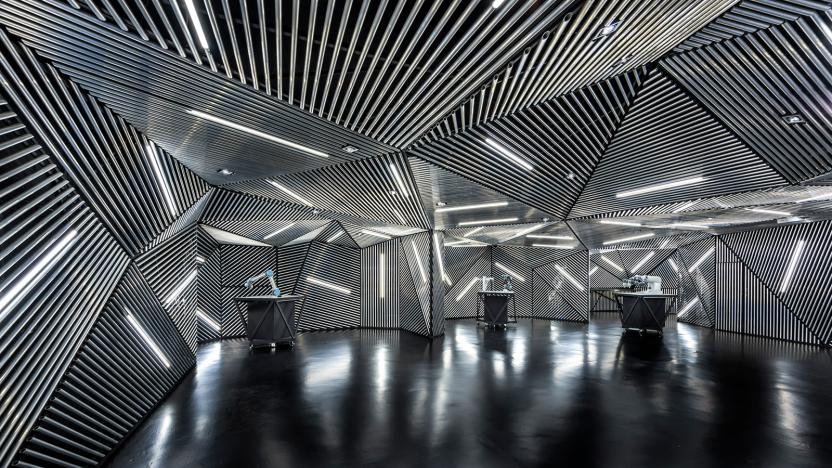
Decor as dystopia at a Singapore robotics training center
What you're looking at is not an art installation or set from the next Tron movie. It's the new RACE Robotics Lab in Singapore, used to display the latest industrial robots and train engineers working on automated assembly lines. According to architect Ministry of Design, the aim was to create "an engaging and future-forward spatial experience that denotes the idea of industrial automation and precision."
Steve Dent05.15.2017
Remembering the first 'photo' of a black hole
Black holes are so outlandish that the scientists who first thought them up figured they couldn't possibly exist in reality. They form from massive, collapsed stars and are so dense that nothing can escape their gravitational pull, including light. Black holes mess with spacetime so badly that scientists have long wondered: How do these things look, exactly? We may be on the cusp of seeing one thanks to the Event Horizon Telescope, but back in 1979, Jean-Pierre Luminet created the first "image" using nothing but an early computer, lots of math and India ink.
Steve Dent04.19.2017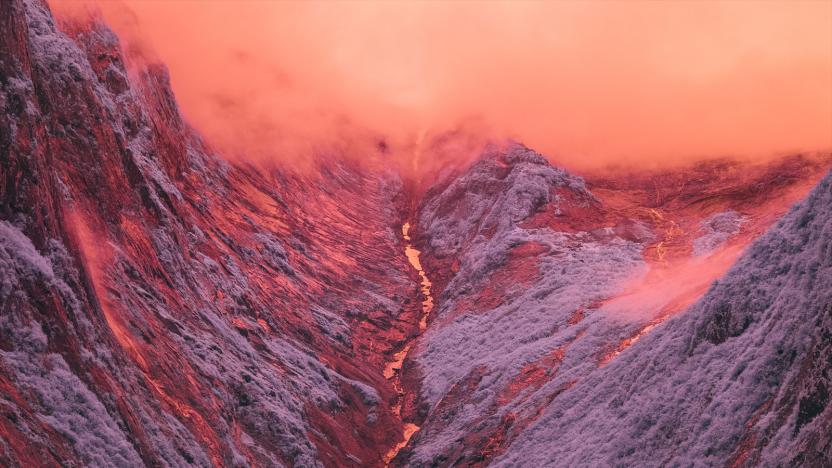
Invisible infrared light reveals a hidden Alaska
Infrared photography isn't just for soldiers or police, it also gives photographers a tool for capturing what is normally unseen. A strong case in point is photographer, artist and Tron title designer GMUNK, aka Bradley G. Munkowitz. He trekked to Alaska's Tracy Arm Fjord last summer with a modified Fujifilm X-T1 IR full-spectrum camera in hand, transforming the already-dramatic landscape into a psychedelic exoplanet.
Steve Dent04.05.2017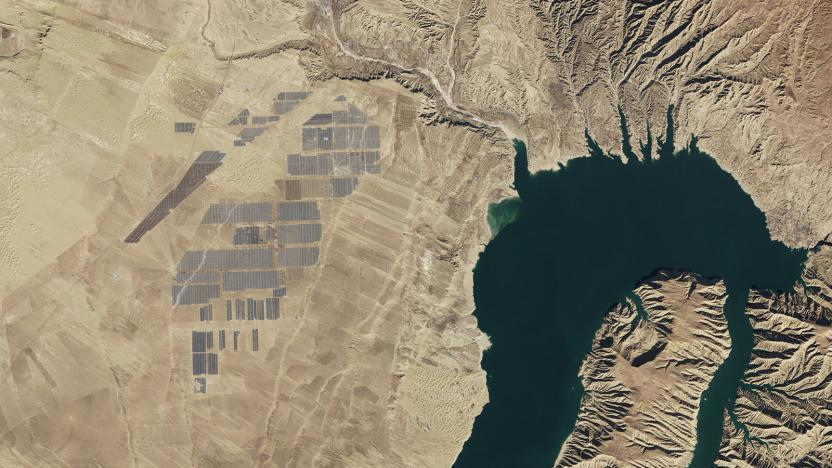
The world's largest solar farm, from space
Just over two years ago, California's 550-megawatt Topaz Solar Farm was the world's largest solar project. A year later, the 579-megawatt Solar Star farm, also in California, laid claim to the crown, and in 2016, India's 648-megawatt Kamuthi Solar Power Project was top photovoltaic dog. However, China is now the leader of this planet-friendly competition, by far, with the 850-megawatt Longyangxia Dam Solar Park. All told, it can power 200,000 homes at the peak of production.
Steve Dent03.08.2017